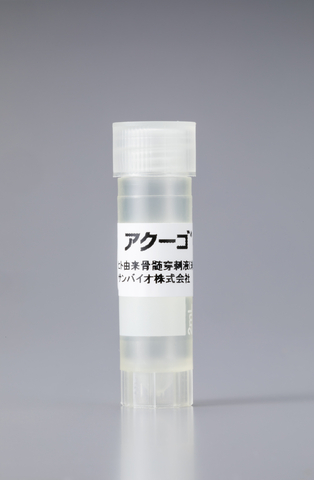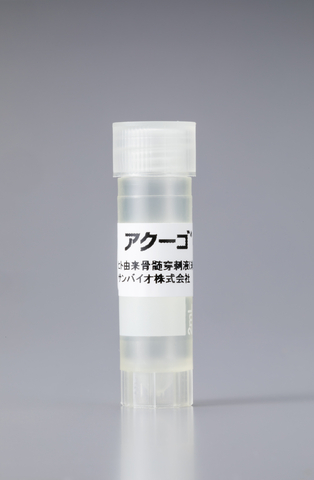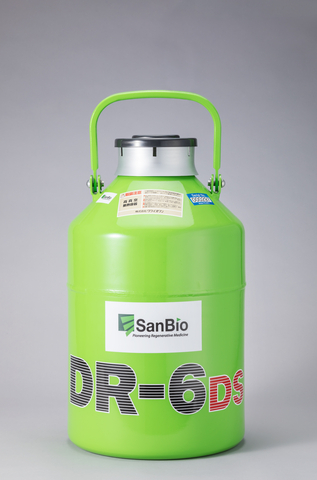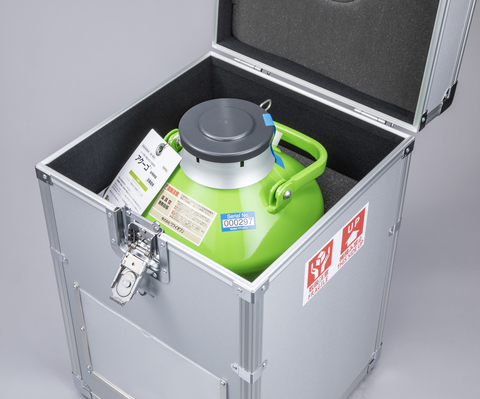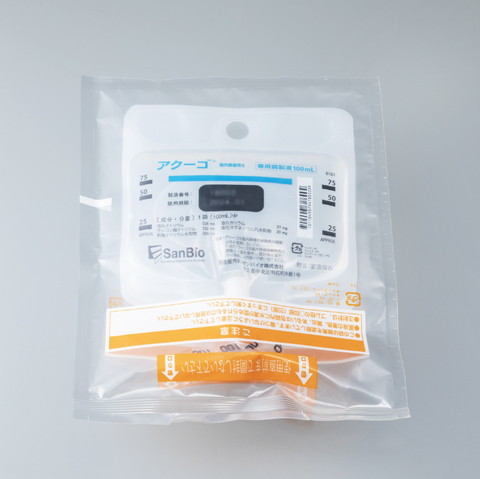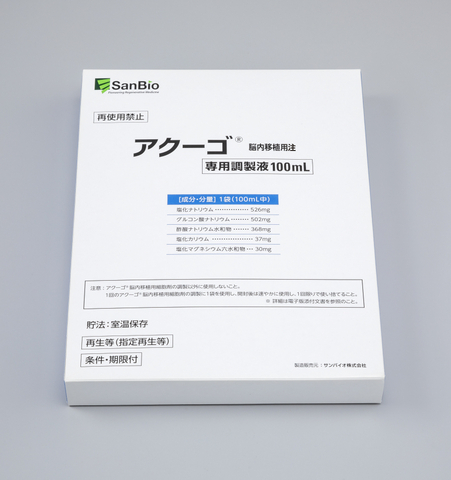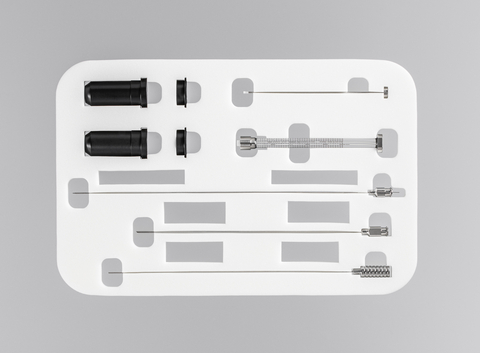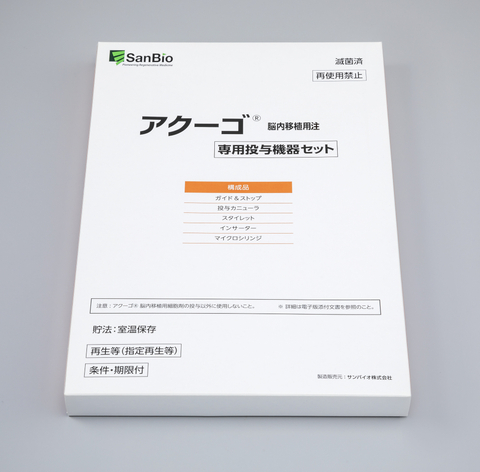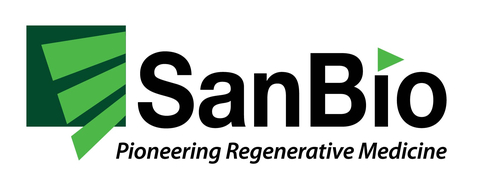TOKYO--(BUSINESS WIRE)--SanBio Co., Ltd. (TOKYO:4592) (head office: Tokyo, representative director & CEO: Keita Mori) hereby announces that today on July 31 2024, it obtained conditional and time-limited marketing approval for the human somatic stem cell-processed product “AKUUGO® suspension for intracranial implantation” (INN: vandefitemcel; hereafter, “AKUUGO®”) in Japan, for the indication of improving chronic motor paralysis resulting from traumatic brain injury.
Traumatic brain injury (TBI) is caused by a strong external force, such as from a traffic accident or a fall, applied to the head, damaging the brain tissue within the skull. The manifestation and timing of symptoms of TBI vary widely among patients, and depending on the affected area of the brain, patients may experience aftereffects such as motor dysfunction or higher brain dysfunction. Studies suggest that destroyed or damaged brain tissues do not regenerate naturally, and patients who enter the chronic phase of TBI and develop motor paralysis face lifelong impacts on their daily and social lives, indicating that there is a significant unmet medical need.
AKUUGO® has been shown to be effective in improving chronic motor paralysis associated with TBI, and is the world’s first and only allogeneic cell therapeutic agent* approved for this indication. AKUUGO® is also a world first in that it facilitates the regeneration of brain, and its approval for practical clinical use marks a significant milestone. AKUUGO® is an allogeneic cell product manufactured by culturing bone marrow-derived mesenchymal stem cells collected from healthy donors and transiently transfecting the human Notch-1 intracellular domain gene into the cultured cells to enhance their ability to regenerate nerve cells. The transplantation of AKUUGO® into damaged nerve tissues in the brain is expected to trigger the release of FGF-2 (a type of protein) and other substances, which in turn will promote the natural regenerative ability of damaged nerve cells and induce proliferation and differentiation of nerve cells. The results of basic research have also shown that AKUUGO® has protective effects on nerve cells, induces angiogenesis, and demonstrates immunomodulating effects.
Mori Keita CEO of SanBio commented as follows.
“We are extremely pleased to announce that we have obtained conditional and time-limited approval for AKUUGO® after 24 years in operation, enabling us to provide it as a new treatment option for TBI patients in Japan. AKUUGO®, which is directly administered to the brain, represents an innovative and crucial choice for patients with chronic motor paralysis associated with TBI. Through AKUUGO®, we hope to bring hope to the lives of as many TBI patients as possible.”
The approval of AKUUGO® was based on the results of the global Phase 2 clinical trial SanBio conducted in Japan and the United States. Dr. Nobuhito Saito, Professor of Neurology at the University of Tokyo led the clinical trial, commented as follows.
“Traumatic brain injury can affect various areas of the brain, and the site and extent of the damage determine the duration and severity of symptoms, as well as aftereffects. Rehabilitation in the acute phase is effective in restoring a certain level of motor function; however, because damaged brain cells do not regenerate, there has been no effective treatment for chronic motor deficit and other aftereffects of traumatic brain injury. The approval of AKUUGO® may provide a new treatment option for patients suffering from the chronic aftereffects of traumatic brain injury, and I look forward to seeing further progress in research and analysis.”
Dr. David O. Okonkwo, Professor of neurological surgery and director of the Neurotrauma Clinical Trials Center at University of Pittsburg commented as follows.
“Patients with chronic traumatic brain injury experience lifelong disability affecting quality of life, particularly those with motor deficits. Living with traumatic brain injury also places burdens on the caregivers who support them. The approval of AKUUGO® is a breakthrough and opens a new chapter in the treatment of motor deficits in chronic traumatic brain injury.”
Dr. Hideyuki Okano, a Keio University professor and SanBio’s founding scientist who has supported the Company over many years, commented as follows.
“For more than 20 years, SanBio has conducted R&D in the field of brain regenerative medicine. I’m pleased that AKUUGO® has been approved for treating chronic motor paralysis resulting from traumatic brain injury, the first such treatment to be approved in the world, and thrilled to offer the product as a new treatment option to patients in Japan. The approval of AKUUGO® in Japan, ahead of anywhere else in the world, brings us closer to achieving our goal of supporting patients with central nervous system disorders, especially brain disorders, around the world who still suffer from the lack of effective treatment options.“
Reference
Product Overview
Brand name |
AKUUGO® Suspension for Intracranial Implantation |
Generic name |
Vandefitemcel |
Indications and effects |
Improvement of chronic motor paralysis associated with traumatic brain injury |
Dosage and administration |
For adults, implant 5 x106 live human (allogeneic) bone marrow-derived mesenchymal stem cells (300μL of cell suspension) to perilesional brain tissues via stereotactic brain surgery using the dedicated delivery device set. Implant the cells into the perilesional area through three trajectories via a burr hole made in the skull. To each trajectory, inject 100μL of the cell suspension, depositing 20μL of the solution each across a total of five sites placed at 5–6mm intervals from the deepest site. The rate of implantation should be approximately 10μL/min. Follow the steps below for implantation. 1. Before starting the procedure, attach the guide & stop and stylet-equipped inserter from the dedicated delivery device set to the head fixation device for invasive neurosurgery. 2. Thaw the cell suspension for intracranial implantation, wash it with the dedicated preparation solution, and adjust the concentration of the cell suspension to 1.67 x 106 cells/100μL using the dedicated preparation solution. Cleanse the micro-syringe fixed with the cannula from the dedicated delivery device set with the dedicated preparation solution before filling it with the prepared cell suspension. |
Date of marketing approval |
July 31, 2024 |
| Condition of approval | |
| 1. | Considering the limited manufacturing record for the Product, the Company shall promptly collect information on the Product’s quality based on a pre-determined plan, and evaluate and report on the equivalence/homogeneity, in terms of quality, of the investigational product (clinical trials product) and the Product intended for commercial distribution. Based on the evaluation results, the Company shall apply for a partial change of approved matters. It shall not ship the Product until the partial change application has been approved. |
2. |
The Company must ensure that the Product is used in medical facilities fully equipped to handle emergencies, by physicians who possess sufficient knowledge and experience in the diagnosis and treatment of traumatic brain injury and stereotactic brain surgery techniques. The physicians must also have sufficient knowledge of the clinical trial results and adverse events of the Product. |
3. |
Until the Company re-applies for marketing approval for the Product prior to the expiration of the conditional and time-limited approval, the Company must conduct post-marketing evaluation of all cases where the Product is used. |
4. |
Until the Company re-applies for marketing approval for the Product prior to the expiration of the conditional and time-limited approval, the Company must collect information on the biological characteristics reflecting the mechanisms of action of the Product and take necessary measures, such as improving its quality control strategy. |
*About allogeneic cell transplantation
Regenerative medicine therapies can be classified into autologous and allogeneic cell therapies. In autologous cell transplantation, the patient’s own cells are harvested and used, but cell processing procedures are time-consuming and labor-intensive. In allogeneic cell transplantation, on the other hand, cells are collected from a donor and cultured in large quantities. Since allogeneic cell medicines can be mass produced, they can treat a large number of patients.
About Traumatic Brain Injury
Traumatic brain injury (TBI) is one of the leading causes of death and disability worldwide. The estimated global incidence of acute TBI during 2016 was 27 million cases, and the estimated global prevalence of chronic impairment secondary to TBI was 55.5 million cases*1. Overall, TBI and long-term motor deficits secondary to TBI significantly impair a person’s self-care, employability, and quality of life, and are major burdens on healthcare systems worldwide. In the United States, approximately 43% of surviving hospitalized persons with TBI experience long-term disabilities*2, and it is estimated that 3.17 million people are living with long-term disabilities secondary to TBI*3. There are about 60,000*4 TBI patients in Japan, and of which, 20%*5 are estimated to suffer from aftereffects of the injury.
About "AKUUGO® suspension for intracranial implantation”
AKUUGO® suspension for intracranial implantation(INN: vandefitemcel) is a human (allogeneic) bone marrow-derived modified mesenchymal stem cell that is produced by modifying and culturing mesenchymal stem cells derived from the bone marrow aspirate of healthy adults. The transplantation of AKUUGO® into damaged nerve tissues in the brain is expected to trigger the release of FGF-2 (a type of protein) and other substances, which in turn will promote the natural regenerative ability of damaged nerve cells and induce proliferation and differentiation of nerve cells. The conditional and time-limited approval was based on the results of SanBio’s global Phase 2 clinical trial. The primary endpoint of the trial—mean change from baseline in Fugle-Meyer Motor Scale (FMMS) score at 24 weeks after treatment—was met, with the AKUUGO®-treated group reporting 8.3-point improvement versus 2.3 for the control group, demonstrating a statistically significant difference. The final analysis of the study was presented at the annual meeting of American Academy of Neurology. We are pushing forward with R&D targeting multiple indications, including chronic effects associated with chronic cerebral infarction.
About SanBio Group (SanBio Co., Ltd. and SanBio, Inc.)
SanBio is engaged in the regenerative cell business—we research, develop, manufacture, and sell regenerative cell medicines. In July 2024, under the Sakigake Designation Program, we obtained conditional and time-limited approval for our mainstay product AKUUGO® for the indication of improving chronic motor deficit resulting from traumatic brain injury. Going forward, we will continue focusing our R&D efforts on central nervous system disorders with significant unmet medical needs that cannot be addressed by existing medicine or drugs. The Company is headquartered in Tokyo, Japan and Oakland, California, and additional information about SanBio Group is available at https://sanbio.com/en/
References
1 James SL, et al. “Global, regional, and national burden of traumatic brain injury and spinal cord injury, 1990- 2016: a systematic analysis for the Global Burden of Disease Study 2016.” Lancet Neurol 2019;18:56-87.
2 Selassie AW, et al. “Incidence of long-term disability following traumatic brain injury hospitalization, U.S.”, 2003. J Head Trauma Rehabil 2008;23:123-31
3 Zaloshnja E, Miller T, Langlois JA, Selassie AW. Prevalence of long-term disability from traumatic brain injury in the civilian population of the United States, 2005. J Head Trauma Rehabil. 2008 Nov-Dec;23(6):394-400.
4 The number of patients under “19 Injury, poisoning, and other consequences of external causes (intracranial injuries)” in Patient Survey 2020, the Ministry of Health, Labour and Welfare
5 The number of patients under “T905 After effects of intracranial injury” in Patient Survey 2020, the Ministry of Health, Labour and Welfare

